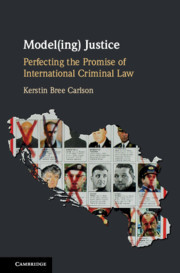Description
Model(ing) Justice
Perfecting the Promise of International Criminal Law
Author: Carlson Kerstin Bree
Considers the ICTY to demonstrate illiberal practices of international criminal tribunals, and proposes a return to process to protect the rule of law.
Language: English
Subject for Model(ing) Justice:
Approximative price 114.03 €
In Print (Delivery period: 14 days).
Add to cart
Publication date: 11-2018
258 p. · 15.6x23.5 cm · Hardback
258 p. · 15.6x23.5 cm · Hardback
Description
/li>Contents
/li>Biography
/li>
The International Criminal Tribunal for the former Yugoslavia (ICTY) was the first and most celebrated of a wave of international criminal tribunals (ICTs) built in the 1990s and designed to advance liberalism through international criminal law. Model(ing) Justice examines the practice and case law of the ICTY to make a novel theoretical analysis of the structural flaws inherent in ICTs as institutions that inhibit their contribution to social peace and prosperity. Kerstin Bree Carlson proposes a seminal analysis of the structural challenges to ICTs as socially constitutive institutions, setting the agenda for future considerations of how international organizations can perform and disseminate the goals articulated by political liberalism.
Introduction: using courts to heal countries: transitional justice and international criminal law; Part I. Using Courts to Heal Countries: Transitional Justice and International Criminal Law: 1. Nuremberg defines our time: the promise of international criminal law; 2. Non-derogation and international criminal law: situating the ICTY; Part II. Applying International Criminal Law's Paradoxes to Paradigmatic International Criminal Law Doctrine: Post Rule of Law Procedure, and Illiberal Theories of Culpability: 3. Post rule of law: international criminal procedure and its evolution before the ICTY; 4. When non-derogable principles meet criminal liability: the justice problem of JCE; Part III. Narrative and Discourse: 5. History, trials, and collective memory; 6. Failures in reconciliation: the lost opportunity of Milan Babic, 'reformed nationalist'; Conclusion, towards 'ICL 3G'.
Kerstin Bree Carlson is an Associate Professor at the University of Southern Denmark and is affiliated with The American University of Paris and iCourts at the University of Copenhagen. Kerstin's research theorizes structural challenges inherent to international criminal law as a means of considering the potential social impact of international criminal justice. She is the recipient of two Fulbright awards (the first to Croatia, and the second to UNESCO in Paris), and several teaching awards.
© 2024 LAVOISIER S.A.S.

